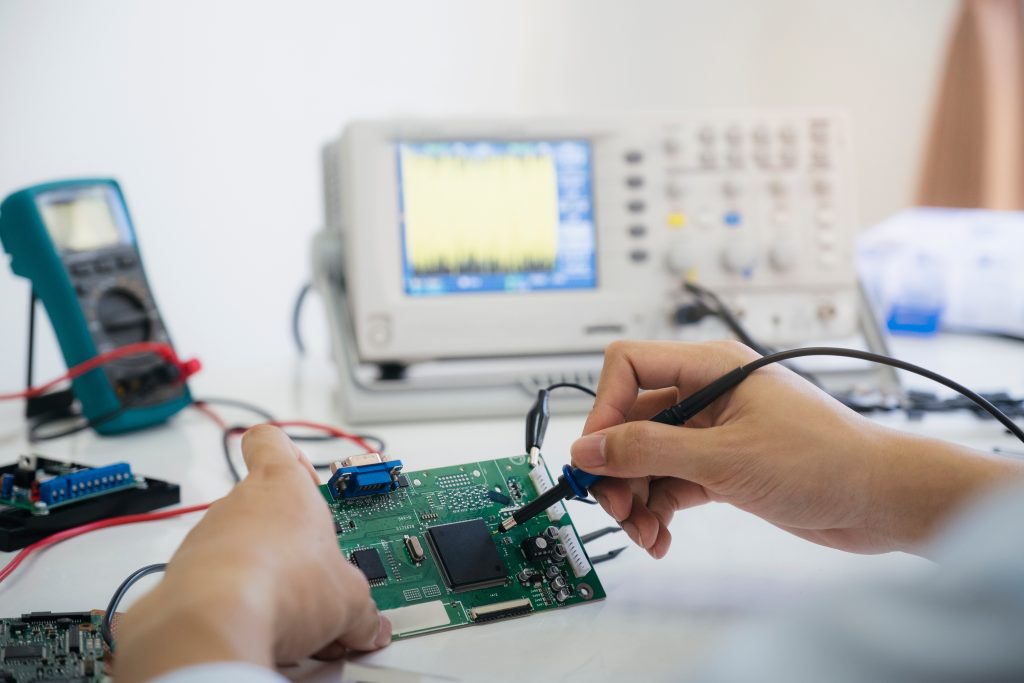Electrical and Electronic Engineering

Electrical and Electronic Engineering
BTEC Level 3 Extended Diploma in Electrical and Electronic Engineering
If you are interested in working in the areas of electronic circuit construction and testing, electrical engineering or control and instrumentation then this may be the course for you.
Is this course right for me?
As part of the course you will acquire knowledge of how to use a range of electronics equipment including digital meters and oscilloscopes as well as using computers and specialist software to design circuit boards.
You will be expected to work on technical problems individually and in groups, using a range of research methods to include reference books and the internet to find information.
To be successful on this course you will need to be able to work as part of a team, solve technical problems and have an awareness of health & safety issues.
Successful completion of the Extended Diploma in year two is equivalent to three A-levels.
What are the entry requirements?
- Five GCSEs at grade C or above (may include one relevant equivalent) to include English Language/First Language Welsh, Mathematics, Numeracy and Science
- Each application is considered on individual merit
- Entry is subject to attending a course information session or informal interview
Current student - what are the entry requirements?
- Successful completion of relevant Level 2 programme with a merit grade or above in addition to a successful decision from progression board meeting
- GCSE English Language/First Language Welsh at grade C or above
- GCSE Mathematics at grade C or above
What will I learn?
Units to be studied include:
- Engineering Principles
- Delivery of Engineering Processes Safely as a Team
- Engineering Product Design and Manufacture
- Applied Commercial and Quality Principles in Engineering
- Electronic Devices and Circuits
- Electronic Printed Circuit Board Design and Manufacture
- Programmable Logic Controllers
- Microcontroller Systems for Engineers
- A Specialist Engineering Project
- Calculus to Solve Engineering Problems
- Electrical Machines
- Electrical Power Distribution and Transmission
- Analogue Electronic Circuits
- Electronic Measurement and Testing of Circuits
- Digital and Analogue Electronic Systems
In addition to your main programme you will also study the WJEC Extended Project Qualification (EPQ), a Level 3 qualification which is graded like an AS level, and can provide additional UCAS points for university entry. It provides opportunities for learners to expand their knowledge, work independently and acquire new skills through a variety of activities which may include: guest speakers, workplace visits and practical experiences
You will also need to attend regular tutorials.
Will I need to study additional English & Maths skills?
You may need to study an additional skills course depending on:
- the course you are taking at College
- what grades you gained in your GCSE Maths and/or English Language
Click below to find out what skills course you may be taking at College.
If you are studying a Workbased qualification:
- Essential Skills Wales (ESW) in Application of Number and Communications, for Progression pathway programmes within the Built Environment Faculty only
All other courses:
- Upskilling Destination Programme – an hour and half session a week developing essential research skills, critical thinking, and academic writing techniques, supporting literacy, numeracy, digital literacy and employability skills
If you are studying a Workbased qualification:
- Essential Skills Wales (ESW) in Application of Number and Communications, for Progression pathway programmes within the Built Environment Faculty only
All other courses and those who have progressed through the internal progression route:
- A one year GCSE Resit Programme in GCSE Mathematics Intermediate Tier (Welsh or English medium) / GCSE English Language
If you are studying a Workbased qualification:
- Essential Skills Wales (ESW) in Application of Number and Communications, for Progression pathway programmes within the Built Environment Faculty only
All other courses and those who have progressed through the internal progression route:
- A one or two year pre-GCSE upskilling course in required subject/s – The priority of this programme (Foundation Maths for Mathematics pathway) is to build fundamental skill and knowledge, to prepare learners for progression onto the one-year, intermediate tier resit programme.
If you are studying a Workbased qualification:
- Essential Skills Wales (ESW) in Application of Number and Communications, for Progression pathway programmes within the Built Environment Faculty only
All other courses:
- A one year pre-GCSE upskilling course in mathematics – The priority of this programme is to build fundamental skill and knowledge, to prepare learners for progression to the Foundation Maths programme.
If you are studying a Workbased qualification:
- Essential Skills Wales (ESW) in Application of Number and Communications
All other courses:
- Upskilling Destination Programme – an hour and half session a week developing essential research skills, critical thinking, and academic writing techniques, supporting literacy, numeracy, digital literacy and employability skills
- A one year GCSE resit course in required subject/s
- Essential Skills Wales (ESW) in Application of Number and Communications, for Progression pathway programmes within the Built Environment Faculty only
For English:
- A one or two year pre-GCSE upskilling course in required subject/s
- Essential Skills Wales (ESW) in Application of Number and Communications, for Progression pathway programmes within the Built Environment Faculty only
For Maths:
- A one year GCSE resit course in required subject/s
- Essential Skills Wales (ESW) in Application of Number and Communications, for Progression pathway programmes within the Built Environment Faculty only
- A two year pre-GCSE upskilling course in required subject/s
- Essential Skills Wales (ESW) in Application of Number and Communications, for Progression pathway programmes within the Built Environment Faculty only
Learners studying on a Jobs Growth Wales (JGW+) programme will be timetabled into literacy and numeracy sessions. To discuss the opportunity of attending a GCSE resit programme, in addition to their JGW+ timetable, please contact skills@pembrokeshire.ac.uk
Can I do this course in Welsh?
Learners have the option to complete course assessment/assignments or elements of the course through the medium of Welsh or bilingually. Visit our Welsh Language in the College page to find out what else is available to you.
How will I be assessed?
- Continuous assessment during the course
- Practical assessment during the course
- Practical examination
- Written examination
- Completion of a final major project
What can I do next?
This course can lead to numerous career opportunities including: Electronic/Electrical Engineer, Instrumentation Engineer, Renewables Engineer, Design Technician, Product Tester, Research Engineer, New Product Developer.
Following successful completion of this course learners could look to progress to a higher level course at the College, seek an appropriate Apprenticeship or go directly into employment.
If you are thinking about studying at degree level following this course please visit the university websites or UCAS (University Central Admissions Service) www.ucas.com to check any entry requirements.
Do I need to bring/buy any equipment?
- Stationery - you will be told about any specific items before you start the course
- A scientific calculator
- You may be eligible for funding. Find out more on our student finance page
Any costs above are approximate and may change.
Are there any additional costs?
- No tuition fee
- We are waiving the Administration Fee for the academic year 2025/26
- You will need to pay a £35 electrical/electronic workshop fee each year before you start the course
- You can rent a locker for £10 per year this will be refunded if the locker remains undamaged and keys are returned
- You may be eligible for funding. Find out more on our student finance page
Any costs above are approximate and may change.
Additional information
| Level: | |
|---|---|
| Mode: | |
| Duration: | 2 years |
Sports Academy: While on this course you may be able to join our Sports Academy, if you have a talent for sport, find out what we offer on our Sports Academy page.



